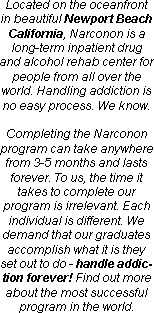
|
Navigate |
| Home |
| Kirstie Alley |
| Our 30th Anniversary |
| Never Turning Back |
| Narconon Endorsements |
| |
|
|
| |
|
|
| |
|
Facts About Drugs |
| FAQ About Ambien |
| FAQ About Ativan |
| FAQ About Cocaine |
| FAQ About Codeine |
| FAQ About Crack |
| FAQ About Darvocet |
| FAQ About Dexedrine |
| FAQ About Demerol |
| FAQ About Dilaudid |
| FAQ About Ecstasy |
| FAQ About GHB |
| FAQ About Heroin |
| FAQ About Hydrocodone |
| FAQ About Ketamine |
| FAQ About Lortab |
| FAQ About LSD |
| FAQ About Marijuana |
| FAQ About Morphine |
| FAQ About Meth |
| FAQ About Methadone |
| FAQ About Opiates |
| FAQ About Opium |
| FAQ About Oxycontin |
| FAQ About Percocet |
| FAQ About Percodan |
| FAQ About Ritalin |
| FAQ About Rohypnol |
| FAQ About Ultram |
| FAQ About Valium |
| FAQ About Vicodin |
| FAQ About Xanax |
  |
|
Resources |

|


 Print this article |  Send this article to a friend |  Add to Favorites |
FAQ
About Ativan
An
estimated 9 million people aged 12 and older used prescription drugs for non-medical
reasons in 1999; more than a quarter of that number reported using prescription
drugs non-medically for the first time in the previous year.
Q) What is Ativan?
A) Ativan is the brand name for Lorazepam, an anti-anxiety agent. Ativan is a benzodiazepine and mild tranquilizer, sedative, and central nervous system (CNS) depressant. Ativan is manufactured in pill form as well as liquid form for injection.
Q) How is Ativan used?
A) Ativan tablets are a nearly white powder and are almost insoluble in water. Each Ativan tablet intended for oral use contains .5mg, 1mg, or 2mg of lorazepam. In liquid form Ativan is intended for intramuscular or intravenous use. Each ml or Ativan injection contains either 2.0 or 4.0 mg of lorazepam, 0.18 ml polyethylene glycol 400 in propylene glycol with 2.0% benzyl alcohol as preservative.
Q) When are the effects of Ativan typically felt?
A) The effects of Ativan are usually felt one to five minutes after receiving it intravenously, 15 to 30 minutes after muscular injection, or 1 to 6 hours after oral administration.
Q) Is Ativan considered addictive?
A) Yes, Ativan is very addictive and can cause psychological and physical dependence.
Q) What are the side effects of Ativan?
A) There are many side effects that come with the use and abuse of Ativan, they included but are not limited to:
clumsiness, dizziness, sleepiness, unsteadiness, weakness, amnesia, insomnia, agitation, disorientation, depression, headache, visual problems, nausea, abdominal discomfort, drowsiness, blurred vision, tachycardia, weakness, disinhibition (where they act inappropriately grandiose or out-of-control), anterograde amnesia (decreased or lack of recall of events during period of drug action) has been reported after administration of Ativan and appears to be dose-related, injectable Ativan results in an increased incidence of sedation, hallucination, and irrational behavior, some patients on Ativan have developed leukopenia, both elevation and lowering of blood sugar levels have been reported.
Cognitive Side Effects
Memory functioning is markedly and measurably impaired, especially the ability to store acquired knowledge into long-term memory. This memory impairment is highly relevant to students. The risk of acute amnesia is more pronounced with short-acting drugs. Ativan (lorazepam), Halcion (triazolam), Xanax (alprazolam) and Rohypnol (flunitrazepam) are especially likely to induce such memory impairment.
Q) What are the symptoms of withdrawal?
A) Withdrawal symptoms, similar in character to those noted with barbiturates and alcohol (convulsions, tremor, abdominal and muscle cramps, vomiting, and sweating), have occurred following abrupt discontinuance of Ativan. The more severe withdrawal symptoms have usually been limited to those patients who received excessive doses over an extended period of time.
Q) What are the symptoms of Ativan overdose?
A) The symptoms of Ativan overdose are degrees of central nervous system depression ranging from drowsiness to coma. In mild cases, symptoms include drowsiness, mental confusion, and lethargy. In more serious cases, and especially when other drugs or alcohol were ingested, symptoms may include ataxia, hypotonia, hypotension, hypnotic state, stage one (1) to three (3) coma, and very rarely, death.
Q) What drug interactions occur with Ativan?
A) Drugs or substances that may interact with Ativan include:
1. Clozaril (clozapine) - when taken with Ativan can increase side effects such as sedation and loss of coordination
2. Heparin, Macrolide antibiotics, Depakene (valproic acid), and Benemid (probenecid) - when taken with Ativan can increase its effects
3. Birth control pills, caffeine/amphetamines/other stimulants, and Theo-Dur (theophylline) - these drugs can reduce Ativan's effects
4. Lithium - when taken with Ativan can lower body temperature
5. Perocet (oxycodone) and other central nervous system (CNS) depressants - can cause a slower rate of breathing when taken with Ativan
6. Dilantin (pheytoin) - can cause Dilatin or Ativan blood levels to change
7. Narcotics, marijuana, tobacco smoking - can increase sedation
8. Sedatives, sleeping pills, other benzodiazepines - combination with Ativan could cause death
9. Alcohol - when taken with Ativan can lower breathing rate and blood pressure resulting in unconsciousness
If
you have a problem with ativan addiction call Narconon Southern California drug
rehab center, we can help 1800 US NO DRUGS

comment corner
 |
| drug rehabilitation saving taxpayers |
California taxpayers are saving more money than expected due to ... |
 |
| Study: Marijuana Causes Lung Damage |
New research finds that smoking three or four marijuana cigarettes ... |
 |
| Thanks to Online Pharmacies, Addiction Can Be Just a Click Away |
WASHINGTON -- Kelly Knable, a 34-year-old mother of three from ... |
 |
| Balancing pain and drug addiction |
Over the past two decades, two conflicting medical ideas have ... |
 |
| Clean break |
... |
 |
| State officials create prescription drug abuse task force |
TALLAHASSEE, Fla. -- State officials on Friday announced the creation ... |
 |
| Florida system often fails to catch Medicaid abuse at source |
FORT LAUDERDALE, Fla. - (KRT) - The victim's skin was ... |
 |
| Marijuana's rising threat: For more kids, use turns into addiction |
John Brown experimented with marijuana at age 10, and it ... |
 |
| Student gets state prison term for selling marijuana |
EASTON -- David Messina had his whole life ahead of ... |
 |
| Man charged in cocaine case forfeits $585,000 |
An Iowa truck driver arrested by Kentucky Vehicle Enforcement officers ... |
 |
| Cocaine Curtails Body's Ability to Cool Off |
In addition to triggering life-threatening cardiovascular episodes, cocaine can be ... |
 |
| Science for Cops |
I admit it: I'm a Law & Order fan. ... |
 |
| New Gene Therapy Could Help Quell Alcoholic Cravings |
One prevailing view of addiction holds that alcohol and other ... |
 |
| One Dose of Cocaine Primes the Brain for Addiction |
It isn't a myth: one dose of cocaine is all ... |
 |
| Marijuana Firmly Linked to Infertility |
Scientists from the University of Buffalo have smoked out what ... |
 |
| Moderate Alcohol Consumption Clouds Brain's Ability to Detect Mistakes |
It's common knowledge that a brain on booze doesn't function ... |
|
Narconon Pictures |
|
   |
|